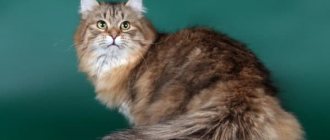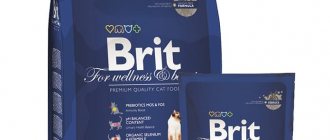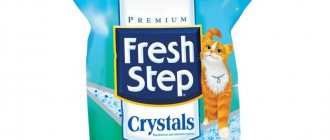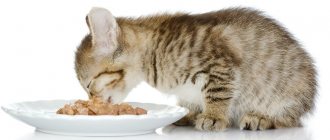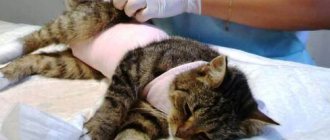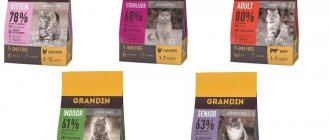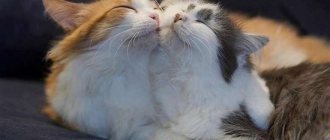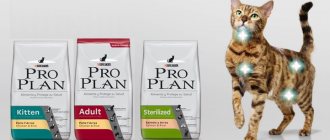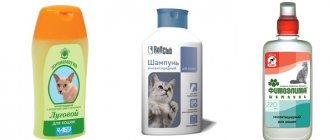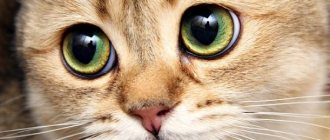The best food for Abyssinian cats
The only sign of high quality nutrition is a healthy and happy pet. The cat won’t tell you about this herself; the condition of her skin, fur, teeth and gums, paw pads, eyes and nose speak for her. If the Abyssinian cat is shiny, active and playful, then it is receiving proper nutrition.
Cheap food from the nearest supermarket is cat poison that you should avoid. Professional food for a purebred animal is “holistic”, “super-premium” or “premium”. We have prepared a list of recommended foods for Abyssinians, but you need to decide what food to feed your pet strictly individually!
Rating of industrial food for Abyssinians
- ORIJEN Tundra (Canada) – holistic food;
- ACANA Pacifica (Canada) – holistic food;
- Arden Grange Adult Cat with fresh chicken & rice (UK) – super-premium class;
- Farmina Matisse Salmon & Tuna (Italy) – premium class;
- Guabi Natural (Brazil) – premium class.
ORIJEN Tundra
High-quality dry food from Canada, containing only fresh meat and fish.
Protein composition (85%): goat meat and by-products, Arctic char, wild-caught duck, rainbow trout, wild boar meat and by-products, fresh deer meat, cod, sardine, lamb, blue whiting. Fresh meat is dried at a temperature of 90°C.
Fruits and vegetables (15%): green peas, lentils, beans, beans, pumpkin, zucchini, apple, pear, carrots, spinach, cranberries, kale, turnip and beet greens, parsnips, rose hips. The source of inulin is chicory root. Cod liver is a natural enhancer of smell and taste. Enriched with Omega-3 and Omega-6 fatty acids.
Plus the food is a grain-free formula with a high percentage of protein.
The disadvantage of food is that it is not always available for free sale.
Price:
- 340 g – 499 rubles (250 UAH);
- 1.8 kg – 2395 rubles (1200 UAH);
- 5.4 kg – 4545 rubles (2272 UAH).
Buy on Zoopassage.
ACANA Pacifica
Return to natural nutrition - the concept of the Canadian company ACANA. This grain-free food contains only fresh, whole ingredients caught in Canada.
Main ingredients (75%): wild perch, silver hake, Pacific sardine, flounder, wild-caught herring. Vegetables, fruits and plants (25%): green peas, red lentils, beans, pumpkin, parsnips, spinach, turnip greens, apples, carrots, pears, cranberries, spinach, blueberries, rose hips.
The food has a balanced protein (37%) and fat (20%) content. Contains the required amount of Omega-3 fatty acids. The vegetables in the food have a low-glycemic formula - this is useful for the prevention of obesity and diabetes. There are no dyes, flavors or artificial additives.
Plus the food: it contains only fresh products.
Disadvantage of food: high cost.
Price:
- 340 g – 360 rubles (180 UAH);
- 1.8 kg – 1697 rubles (848 UAH);
- 5.45 kg – 3754 rubles (1877 UAH).
Buy on Zoopassage.
Arden Grange Adult Cat with fresh chicken & rice
Super premium food line from the UK. Protein content – 31%, fat – 19%.
Ingredients: chicken meal, fish meal, chicken fat, fresh chicken, egg powder, fish oil, brewer's yeast, beet pulp, rice, corn. As a natural vitamin supplement – cranberry. A mixture of tocopherols and rosemary extract ensure the safety of the feed.
To enhance immunity and maintain healthy intestinal microflora - prebiotics MOS and FOS. Vitamins: A, D3, E. Microelements: calcium, phosphorus, copper. Amino acid – taurine.
Plus food: contains glucosamine and chondroitin.
Disadvantage of food: corn - may be an allergy.
Price per pack of 0.5 kg – 375 rubles (buy on Zoopassage).
Farmina Matisse Salmon & Tuna
Complete food made in Italy with salmon and tuna. Crude protein content – 32%, crude fat – 11%.
Ingredients: dried tuna and salmon, rice, dried chicken, chicken fat, beet pulp, fish oil, egg, vegetable oil, dry yeast, corn gluten. Vitamin composition: A, D3, C, E, B2, B6, B1, B12, folic acid. Minerals: zinc, iron, copper, manganese, magnesium, calcium iodate. Does not contain chemical additives.
Plus feed: affordable cost.
Disadvantage of the food: the composition does not contain vegetables and fruits.
Prices:
- 1.5 kg – 773 rubles (386 UAH);
- 10 kg – 3804 rubles (1902 UAH);
- 20 kg – 7604 rubles (3802 UAH).
Buy on the Dogeat website.
Guabi Natural
Premium Brazilian-made food for adult animals with a high protein (34%) and fat (16%) content.
Main ingredients: fresh chicken, salmon, chicken liver, chicken by-products, powdered eggs, pork plasma, wheat gluten, fish oil, beet pulp, sugar cane pulp, brewer's yeast, vegetable oil.
Additives: green tea extract, apple extract, rosemary extract, yucca schidigera, prebiotics and taurine. The food contains a vitamin and mineral complex. Yucca schidigera extract minimizes stool odor.
Plus feed: a balanced ratio of proteins and fats.
Disadvantage of the food: contains wheat gluten and pork plasma.
Feed price:
- 1.5 kg – 677 rubles (338 UAH);
- 3 kg – 1354 rubles (677 UAH);
- 7.5 kg – 2929 rubles (1464 UAH).
Buy on the website happy-pet.
Important!
Professional food, premium class and higher, contains all the necessary additives and vitamins - there is no need to include additional vitamin and mineral complexes in the animal’s diet.
Choosing a place and utensils for feeding
Abyssinian kittens show their spirited nature at an early age, so if you have other pets, make sure they do not compete for food. Abyssinians are unexpectedly strong and agile even in childhood, so it is better not to provoke them into defending their own territory.
The choice of place and utensils for feeding plays an important role in shaping the character of the pet. If the dimensions of your home do not allow you to feed the kitten separately, move its bowls to the windowsill (another elevated area) or behind the kitchen door. If necessary, feed your pets at different times.
When choosing bowls, give preference to deep models made of ceramic or stainless steel. Make sure the bowl isn't too narrow so that your cat's whiskers won't touch the sides.
What to feed an Abyssinian kitten
Now let's talk about the nutrition of Abyssinian babies. Kittens of this breed are considered babies up to 1 year old. The Abyssinian's body develops a little slower than the body of kittens of other breeds, so up to a year they are fed only with special food for kittens.
The Abyssinian is introduced to the first complementary foods at the age of 1.5-2 months. This can be ready-made wet food for kittens, milk porridge, egg yolk or thoroughly ground meat, fish and vegetables. Some owners give their pets baby meat and vegetable puree in jars (“Agusha”, “Tema”). You can give soft cheese and low-fat cottage cheese in small quantities. Milk is only goat milk or special milk, which is sold in pet stores. At the age of 3 months, teeth begin to change, so solid food should predominate in the kitten’s diet. Vegetables and meat are cut into larger pieces so that the pet gets used to chewing. Dry junior series are added to wet food. Feeding frequency up to four months – 6 times a day. From 4 months to one year – 4 times a day.
All the details of feeding kittens are here.
Adult food can be given only in the second year of life. This needs to be done gradually - Abyssinians have a sensitive gastrointestinal tract. The portion of “adult” food is increased, while at the same time the portion of “children’s” food is reduced. This transition can last 1 month. The frequency of feeding is reduced to 2-3 times a day.
At home, Abyssinian kittens can be fed only with professional food of premium class and higher. Immediately forget about the existence of cheap economy options. Good food for your pet is sold in specialized pet stores. These may be products from the following companies:
- Acana;
- Orijen;
- Mera Cat;
- Guabi Natural;
- Arden Grange;
- Farmina;
- Royal Canin.
When choosing food for the appropriate age group, do not forget to look at the expiration date and country of origin.
Breeders do not recommend feeding Abyssinians with Russian-made food due to its non-compliance with international standards.
Important: the kitten should always have fresh water. Bottled or raw filtered will do.
Up to a month
Until the age of one month, kittens should feed exclusively on mother's milk.
Under circumstances that do not allow natural feeding, the kitten is transferred to a cat's milk replacer. Natural menu:
- Goat milk diluted with boiled water.
- Scott's kitten mix.
- Tiling mix for kittens.
Industrial menu:
- Cat milk replacer.
- From 1.5–2 weeks – infant formula “from 0” (without additives and sugar).
The daily food intake for an Abyssinian kitten under the age of one month ranges from 30 to 50 ml, depending on the number of babies in the litter, individual characteristics and dimensions. Number of feedings for an Abyssinian kitten under one month of age:
- From birth to 2 weeks, feeding every 2 hours – 10 times a day.
- From 2 to 4 weeks, feeding every 2–3 hours – 8 times a day.
When artificially feeding kittens, it is important to do everything possible to ensure that their intestinal microflora is formed correctly and in a timely manner. Diarrhea or other problems with digestion of food are deadly for babies under one month of age.
Advice: if you do not have experience feeding newborn kittens, it is better to consult a veterinarian.
Nutrition for illnesses
In many clinical diseases, diet is of great importance. Of course, it does not replace medications, but it can speed up the recovery process for a sick pet. Abyssinians are considered a relatively healthy breed; they rarely suffer from genetic diseases. But, like all cats, with age or due to stress or an unbalanced diet, they can develop kidney disease, liver disease, allergies, obesity or gastrointestinal disorders.
Medicinal food for Abyssinian cats
- Hill's Prescription Diet Metabolic + Urinary Feline dry – excess weight, urolithiasis;
- Hill's k/d – kidney diseases;
- Hill's z/d – treatment of food allergies;
- Hill's w/d – colitis, constipation;
- Hill's i/d – gastrointestinal diseases;
- Royal Canin Urinary S/O LP34 – stones in the bladder;
- Royal Canin Fiber Response – constipation;
- Purina Veterinary Diets UR – urolithiasis;
- Purina Veterinary Diets NF – kidney pathology;
- Purina Veterinary Diets OM - obesity.
Important: it is unacceptable to prescribe a therapeutic diet on your own - veterinary food, like medications, must be prescribed by a doctor.
About treats for cats
It is impossible not to pamper an Abyssinian who has become a pet with tasty treats. The special treats produced for cats are not food, but they add variety to the regular diet, which has a beneficial effect on the mood and health of the pet. Manufacturers add only natural ingredients (meat, cheese, fish) and healthy vitamins to all sorts of “mnyams” and “mur-r-meladas”. The treat can be either a dessert or a reward for completing a rule or trick, but in no way should it upset the overall nutritional balance. The negative aspects of pampering include: - getting used to tasty things and refusing regular food; - the risk of gaining excess weight due to the caloric content of products; - incompatibility with the main, especially dietary, type of feeding, leading to disorders. The main thing is to let your pet understand that a tasty morsel must be earned. Proper nutrition is the key to the health of Abyssinian cats. A frivolous attitude towards the animal's menu, random feeding without taking into account the needs will lead to problems. Their solution is much more difficult and expensive than caring for high-quality cat food. Remember that not caring about a good diet can bring your pet illness, suffering, and early death of the Abyssinian cat.
Read all about the Abyssinian breed in the Main article
Natural nutrition
If your choice falls on natural nutrition, be prepared to spend your time developing a balanced menu and preparing cat food. The main rule is that cats do not eat human food!
What should be on the menu for an adult Abyssinian:
- raw (frozen) beef – 100-120 gr. daily;
- turkey or boneless chicken – 3-4 times a week;
- raw (frozen) or boiled chicken and beef offal (kidneys, lungs, heart) – 1-2 times a week;
- raw liver – once a week;
- boiled egg yolk – in its pure form 1-2 times a week;
- shrimp - as a delicacy;
- low-fat fermented milk products (kefir, yogurt, fermented baked milk) – every other day;
- soft unleavened cheese – once a week;
- low-fat cottage cheese – 1-2 times a week;
- cereals (rice, buckwheat - boiled, Hercules - steamed) - several times a week, mixed with protein foods (fish, poultry, meat);
- vegetables, raw or boiled (puree) - daily;
- greens (spinach, lettuce), sprouted wheat grains - several times a week;
- vegetable oil – 1/2 teaspoon every other day;
- dry brewer's yeast – 3-4 times a week;
- mineral and vitamin supplements - daily.
Read how to choose the right vitamins for your cat.
We’ve decided on the list of necessary products, now let’s talk about how to properly give food to cats. Cat food should be warm, preferably room temperature. Frozen foods must first be thawed at room temperature and doused with boiling water. Meat, fish and vegetables for kittens must be chopped and all bones removed. For adult cats, it is enough to cut everything into pieces.
Natural diet
A natural diet for an Abyssinian kitten includes:
- Feeding raw and cooked foods in pure and mixed form.
- Feeding exclusively raw foods.
- Feeding with homemade semi-finished products.
Benefits of a natural diet:
- You can control the freshness and quality of the products.
- The ability to regulate the calorie content of food.
- Taste variety.
- Saving money - a natural diet is 2-3 times cheaper than food of similar quality.
Disadvantages of a natural diet:
- Time-consuming – cat food needs to be prepared separately and regularly.
- Natural food should not be left in an automatic feeder.
- With a natural diet, the cat needs to regularly take vitamin courses.
An Abyssinian kitten can be switched to a natural diet from the age of one month.
- Up to 4 months, the diet should be based on dairy products.
- From 4 months, some cats develop lactose intolerance; in this case, whole milk is replaced with fermented milk products.
- By the age of 8–9 months, the owner needs to accustom the cat to a diet of healthy foods, since it is extremely difficult to accustom adult animals to eat vegetables.
Pros and cons of different types of feeding
It is possible to ensure the full functioning of Abyssinian cats by three types of feeding: - natural products; — ready-made dry and canned wet food; - in a combined way, including the previous paragraphs. You can make a choice in favor of one of the types and feed your pet correctly if you know about the characteristics of each of them.
What is included in a natural diet
The very definition of “natural food” evokes a positive response in people. Especially if you add “ecologically friendly nutrition”. When choosing this way to meet the needs of a purebred Abyssinian cat, you will have to learn about all the components of the cat’s, cat’s or kitten’s diet that the animal needs. After all, manufacturers add the necessary additives to ready-made food - this greatly simplifies the tasks of the owners of Abyssinian cats. In uncanned food, the necessary vitamins and microelements may be insufficient or in excess if the same type of food is given.
List of foods that should be given to an Abyssinian cat
A sufficient natural diet means the periodic, proportionally adjusted presence in the menu of the following foods: - dairy products; - cottage cheese (preferably goat's) and/or low-fat sour cream, fermented baked milk, yogurt, but not cow's milk; - boiled or raw (but always frozen!) meat in the form of minced meat or finely chopped product - rabbit, beef (but not veal), lamb are suitable; - boiled poultry (turkey, chicken (not breast); - liver and offal - also frozen, in no case pork; - eggs (eats only boiled yolk, preferably quail, 1-2 times a week); - fish (only sea, since river water contains parasites, as well as many small sharp bones) and fish oil; - a small amount of cereals, sometimes legumes (cooked, but not boiled, include rolled oats, rice, buckwheat, sprouted grains); - boiled or grated vegetables (carrots, zucchini, beets, broccoli, chopped in a blender or finely chopped); - vegetable oil (preferably olive or flaxseed, half a teaspoon every other day); - greens - special grass for cats.
Salt, and especially sugar, even in minute quantities, should be avoided in the Abyssinian cat’s food, and the ratio of products should be as follows: - meat or fish - 50%; — fermented milk, eggs and cereals — 40%; — vegetables plus herbs — 10%.
Permanent additives to natural food include: - brewer's yeast (dry, up to 4 times a week); - mixtures that include microelements and vitamins necessary for the Abyssinian cat. The owner of a mustachioed friend will have to keep a diary to maintain a varied diet and not overdo it with additives.
Rules for preparing natural food. Norms
In addition to the fact that you need to calculate what and how much to give your Abyssinian cat, it is important how to prepare and offer the food. The general rules are as follows: - always give fermented milk and meat (fish) products at different feedings; - always pour boiling water over it, but if possible do not subject it to heat treatment, which reduces the nutritional value of products such as meat, fish, vegetables; - offer meat with vegetables and herbs; — get used to unfamiliar food gradually, starting with a small amount, and observing whether allergy symptoms appear.
Natural food should be thick in consistency and served lukewarm to the cat - the animal does not eat hot!
Its norms are calculated using the formula: multiply the weight of the animal by 5, divide by 100. Ideally, an adult cat should quickly eat the given portion, leaving nothing “for later.”
Ready-made food for the Abyssinian cat breed
Choosing industrially produced food greatly simplifies the task of balanced nutrition. However, cheap offers from supermarkets, breeders believe, are cat poison. They destroy both the digestive and genitourinary systems, and are especially harmful during the growth period of the kitten. For a purebred animal, you need professional dry and wet food - “holistic”, “premium”, “super-premium”. They include natural meat, sometimes grains, vegetables or fruits, prebiotics (FOS, MOS), a set of vitamins, microelements (calcium, copper, phosphorus, etc.), amino acid (usually taurine).
Recommendations for choosing industrial feed
Having chosen a certain brand of ready-made food specifically for Abyssinian cats, it is better to stick to the choice or not change it suddenly. Different manufacturers, adhering to the composition as a whole, include their additives in food in their own proportions. A radical change in menu can have a negative impact on your pet's stomach. In addition, be sure to take into account: - age category of packaging - children's, junior, adult food, food for older cats; — targeting of food for the special condition of the animal: pregnancy, specific disease, tendency to obesity. You need to add dry or wet food exactly as much as recommended on the packaging or in the instructions, without giving in to your pet’s “persuasion” for more. It is very undesirable to completely abandon the share of the natural menu in the diet of an Abyssinian cat. For an adult Abyssinian or Abyssinian, especially neutered ones who are prone to overeating, overfeeding is more dangerous than mild hunger - obesity will lead to a number of different diseases.
Mixed feeding
The combined type of nutrition of an Abyssinian cat means a combination of natural food with industrially prepared food. This usually happens when the owner does not constantly cook for the Abyssinian due to lack of time, for example, on weekdays. In this case, it is important to introduce a system of alternating types of diet. Having become accustomed to not being given dry food on weekends, the cat will gradually stop begging for “tasty food” and limit itself to natural products. Mixed feeding is fraught with imbalance - the Abyssinian cat’s menu may contain too many or few of the necessary components. Therefore, in this case, the cat’s owner will also have to keep records. An Abyssinian cat should not need to drink - clean dishes and water changed daily should be kept close to the bed. The cat's dishes should not be left with dried food residues; the bowl should be washed after feeding.
